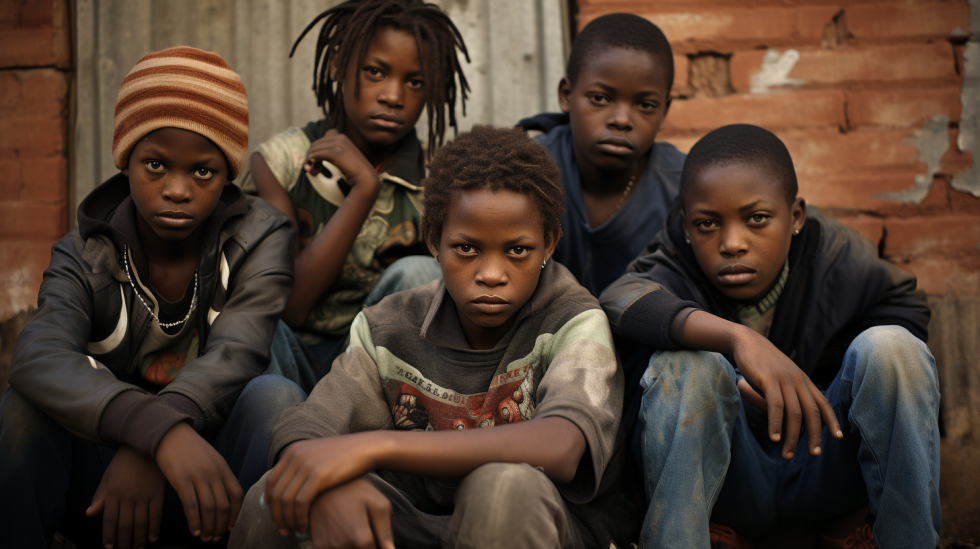Youth all around the world encounter a myriad of challenges as they transition into adulthood, and South African youth are no exception. The socio-economic landscape, cultural factors, and limited access to resources in South Africa often expose its youth to unique risky situations. This article explores six common risky situations that South African youth frequently encounter, discussing the potential consequences and implications for their well-being and development.

Unemployment and Economic Precarity
South Africa faces high rates of youth unemployment, resulting in economic precarity for many young individuals. The lack of job opportunities can lead to feelings of hopelessness, frustration, and financial dependence. In such situations, youth might resort to risky behaviors like involvement in criminal activities, substance abuse, or unsafe labor practices in search of income. The cycle of unemployment can adversely affect their mental health, self-esteem, and overall life prospects, hampering their ability to contribute positively to society.
Peer Pressure and Substance Abuse
Peer pressure remains a prominent challenge for South African youth, especially in urban areas. The desire to fit in and gain social acceptance can lead to experimentation with drugs and alcohol. Substance abuse can have severe physical and mental health consequences, ranging from addiction and impaired cognitive function to increased susceptibility to accidents and violence. Additionally, substance abuse can hinder academic performance, disrupt family relationships, and perpetuate a cycle of risky behaviors.
HIV/AIDS and Unprotected Sex
South Africa has one of the highest HIV/AIDS prevalence rates globally, with young people being particularly vulnerable. Factors such as lack of comprehensive sex education and cultural norms contribute to risky sexual behavior among youth. Engaging in unprotected sex increases the risk of contracting sexually transmitted infections (STIs) including HIV. The lack of awareness and access to contraceptives and healthcare services exacerbates this problem, leading to potentially life-altering consequences for youth’s health.
Violence and Crime Exposure
Many South African youth grow up in communities with high levels of violence and crime. Exposure to violence, whether as victims or witnesses, can have long-lasting psychological effects. Youth who experience violence may struggle with trauma, anxiety, and depression, which can hinder their emotional and social development. Additionally, growing up in an environment rife with crime can normalize criminal behavior, leading some youth to engage in illegal activities to survive or gain status within their communities.
Limited Educational Opportunities
Educational opportunities for South African youth are often hindered by factors such as inadequate school infrastructure, lack of resources, and socio-economic disparities. Some youth may not have access to quality education, leading to limited career prospects and perpetuating cycles of poverty. This situation can lead to frustration, disengagement from learning, and increased susceptibility to negative influences.
Political and Social Unrest
South African youth have grown up in a country marked by political and social upheaval. While the post-apartheid era brought hope, many young individuals still experience the impacts of historical injustices. Political protests and demonstrations are common, and youth are often at the forefront of demanding change. However, participating in protests can expose them to risks of violence, arrest, and clashes with authorities. Balancing the desire for change with personal safety is a challenge that many South African youth face.
Conclusion
South African youth face a range of risky situations that are unique to their socio-economic, cultural, and historical context. From economic precarity and substance abuse to HIV/AIDS vulnerability and exposure to violence, the challenges they encounter can have far-reaching physical, mental, and societal consequences. To address these issues effectively, it is crucial for policymakers, educators, and communities to collaborate in providing comprehensive support systems, including access to quality education, mental health resources, healthcare services, and positive role models.
Promoting youth empowerment, mentorship programs, and innovative solutions tailored to their needs can help mitigate the negative impact of these risky situations. By investing in the well-being and development of South African youth, the nation can cultivate a generation that contributes positively to society, breaks cycles of disadvantage, and ultimately drives progress toward a more equitable and prosperous future.
